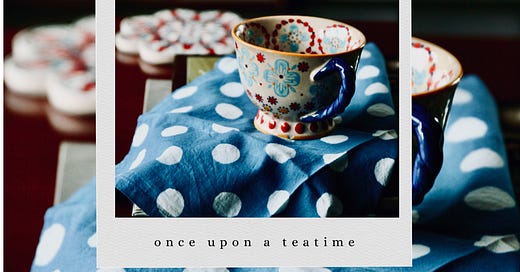Hello, Reader.
I’m typing this on my phone as I stand in the early morning December gloom of the kitchen. Now that the persimmon tree between our houses has lost its leaves, the pale yellow glow of the lights in the neighbors’ house reaches me, and I can discern the shape of the pot in the drawer. I fill it with water (about two cups of water for two cups of chai) and set it on the hot plate. I’ve just turned on the heating, and the room is cold, so I hover over the pot, waiting for the steam to rise.
I usually make our morning cups of chai. I like to rise early and make my way down the stairs. In the dark, I always overestimate the last step, and I remember to brace myself with a hand on the wall. I nod at the old kalamkari painting that hung in my childhood home and is now mine, and I make my way past a birthday balloon bobbing like a much-loved pet and past vacation photos. As I walk through the house to the kitchen, I whisper my favorite prayers to the sun and the gods.
When I feel the welcome warmth of the steam on my face, I quickly add tea (2 3/4 tsp of loose leaf tea) to the water and set out our preferred cups on the countertop: mine is just the right size and heft, has a generous lip, and a small chip at the base. I think I love it even more because of that tiny chip and because I haven’t been able to find another cup just like it. I add a small amount milk to the brew and do the usual debate about sugar or no sugar before guiltily deciding yes. Morning chai is ready.
I grew up loving teatime. It was that part of the day (mornings, afternoons, and sometimes, late evening) when time stood still, and the adults put aside their busyness, worries, differences, and their peculiar adult-ness and sat down to drink tea with a biscuit or two. There were no fancy tea services or teapots, just small mugs of hot, sugared chai brewed over a gas flame. As a child, and before I was deemed old enough to drink tea, I watched this daily tradition with wide-eyed wonder. As a family ritual, it offered a profound sense of security (the Latin root of the word is securus or free from care). All was okay because it was teatime. All was okay because there was time for tea. It represented a vital, necessary, and generative pause - you stop what you are doing and sit down to enjoy your tea. As an adult, I still think of brewing tea and making time to drink it as an anchor that stops me from being swept away by life, and it has become part of my love language. Inviting you to tea, brewing you a cup, is how I show I care.
Of course, not all pauses are generative. For example, every time something happens in my life, I realized I pause my writing, putting it on hold until everything (and everyone) is taken care of. A holding pattern makes it hard to gather momentum and move forward. I make it disposable, even as I know that it’s soul work. I don’t want to do that anymore. And, so, here’s my wish for both of us, that, in the coming year, we make time for, and enjoy, rejuvenating pauses, and we make it a priority to do our soul work.
xo
Priya
It’s your turn.
What are the small rituals/traditions that help you navigate life?
Do you create planned pauses in your daily/weekly/monthly schedule? What do they involve?
What are you ready to prioritize and make time for?
Thank you for reading Ten Thousand Journeys! You can help me reach new readers by sharing this post on social media!
Not a subscriber yet?






I grew up loving tea time too. Whether it was at school, college, office or at my home when I lived by myself, I considered that the happiest, meditative part of the day. These days, I am realising that milk is irritating my tummy and I don't want to make a switch because nothing is as good as milk tea with spices. So I end up not having tea sometimes.
I relate to how writing is the first thing we stop doing. My newsletter is sent out once every month, and during the last 2 months, I haven't gotten to writing it since I have been focusing on other aspects of life. I want to be able to give time for it in the coming year as well
It’s so true that not all pauses are generative. I find that despite wanting to write more than anything else, it is the first thing that I tend to put on hold in the face of any disruption.
Unlike many Indian families, mine never had any teatime rituals. It could be why I struggle to find designated moments of peace in my day. Perhaps it is time for me to create room for some generative pauses, hoping that they will help restore the momentum of writing.